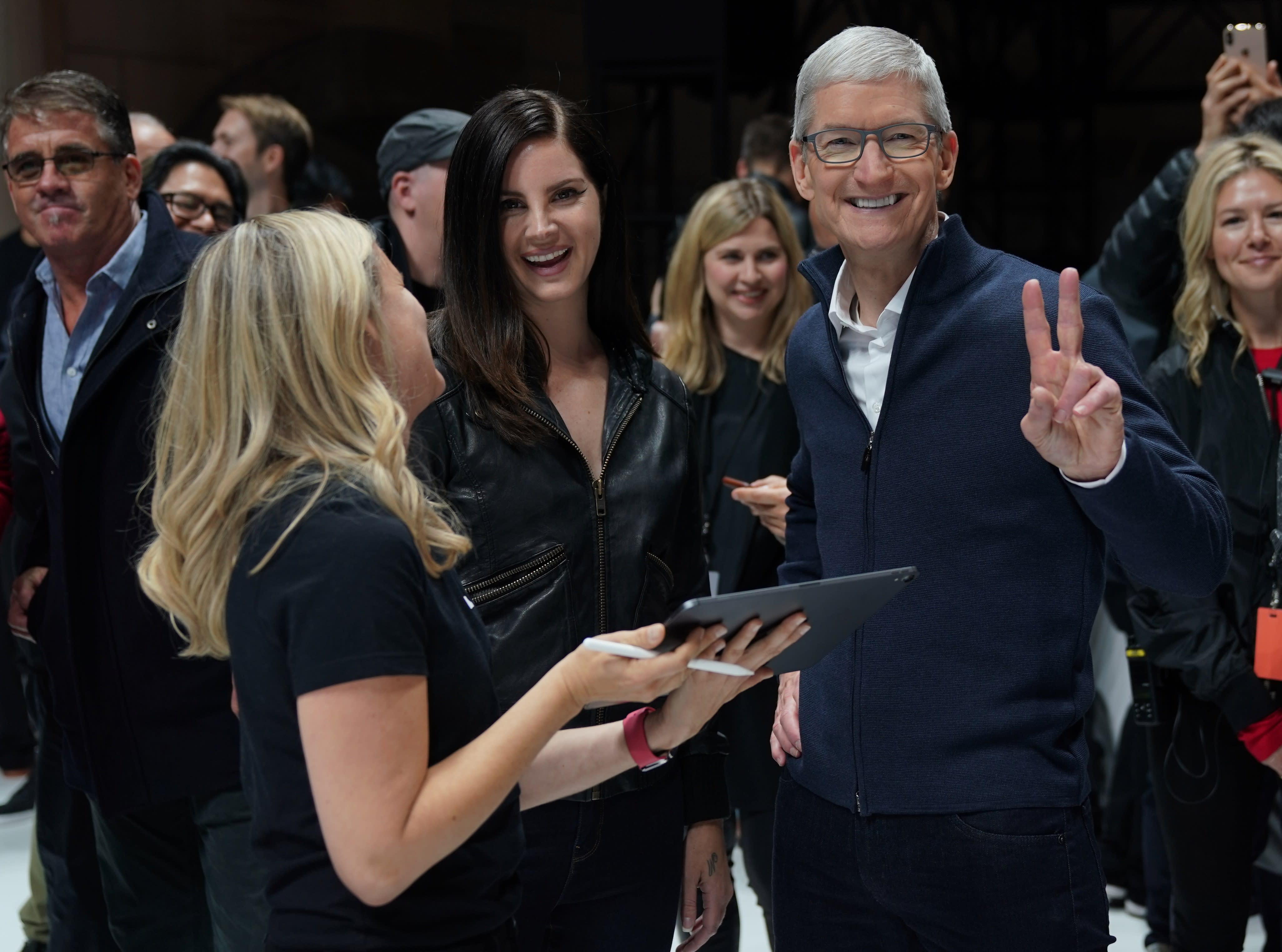Is This Apple CEO Tim Cook's Worst Year Yet?

Table of Contents
Apple, under CEO Tim Cook, has long been a symbol of innovation and consistent growth. However, recent challenges have sparked debate: is 2024 shaping up to be Tim Cook's most difficult year at the helm? This article delves into the key factors fueling this discussion.
Slowing iPhone Sales and Market Saturation
Weakening Demand
The iPhone, Apple's flagship product, has historically been a major driver of revenue and profit. However, recent reports indicate a weakening demand for iPhones compared to previous years. Several market analyses show a decline in year-over-year sales, raising concerns about market saturation. This slowdown isn't simply a matter of seasonal fluctuations; it points towards deeper underlying issues.
- Increased Competition from Android: The Android operating system continues to gain significant market share, with manufacturers like Samsung and Google offering powerful and affordable alternatives to the iPhone. This intensified competition is putting pressure on Apple's pricing strategies and market dominance.
- Higher Prices: Apple's premium pricing strategy, while historically successful, may be facing its limits. In a time of economic uncertainty, consumers are more price-sensitive, leading some to opt for more affordable Android devices.
- Slowing Global Economy: The global economic slowdown is impacting consumer spending across various sectors, and the electronics market is no exception. Consumers are delaying purchases of high-priced electronics like iPhones, further contributing to the sales decline.
Keyword integration: iPhone sales, market saturation, smartphone market, Apple sales figures, Apple revenue.
Innovation Concerns
While Apple continues to release new iPhone models each year, concerns are growing about whether these updates are significant enough to entice consumers and drive sales. Some argue that the recent iPhone innovations are incremental rather than revolutionary, failing to offer the "must-have" features that fueled previous sales cycles.
- Incremental Updates: Critics argue that recent iPhone models have focused on minor improvements, like enhanced camera capabilities or slightly faster processors, instead of groundbreaking new features.
- Competitor Innovations: Android manufacturers are constantly introducing innovative features like foldable screens, advanced camera systems, and unique software integrations, putting pressure on Apple to maintain its technological edge.
- The iPhone Product Cycle: The very success of the iPhone has led to a degree of market saturation, making it more challenging for each new iteration to significantly boost sales.
Keyword integration: iPhone innovation, new iPhone features, Apple product cycle, iPhone 15, iPhone 14.
Increased Competition and the Shifting Tech Landscape
The Rise of Android
Android's continued growth poses a significant challenge to Apple's dominance in the smartphone market. The diverse range of Android devices, catering to various price points and preferences, has significantly eroded Apple's market share in certain regions.
- Samsung's Dominance: Samsung, the leading Android manufacturer, has consistently released competitive phones with impressive specifications and features.
- Google's Pixel Line: Google's Pixel phones, known for their excellent software integration and camera capabilities, are carving a niche for themselves in the premium smartphone market.
- Other Android Competitors: Numerous other manufacturers, like Xiaomi, Oppo, and Vivo, are aggressively expanding their global presence, offering compelling alternatives to Apple's products.
Keyword integration: Android competition, smartphone market share, Apple vs Android, Samsung Galaxy, Google Pixel.
Emerging Technologies and Apple's Response
Apple is investing heavily in emerging technologies like Augmented Reality (AR), Virtual Reality (VR), Artificial Intelligence (AI), and electric vehicles. However, its progress in these areas remains a subject of debate, compared to the rapid advancements of competitors.
- Apple Vision Pro: While the Apple Vision Pro represents a foray into the AR/VR market, its high price point and limited initial applications may hinder its widespread adoption.
- Apple's AI Efforts: Apple is integrating AI into its existing products, but hasn't yet released a groundbreaking AI product comparable to the innovations from Google or OpenAI.
- Apple Car (Project Titan): Details about Apple's electric vehicle project remain scarce, leaving its future impact uncertain and giving competitors a significant head start.
Keyword integration: Apple AR/VR, Apple AI, electric vehicle market, Apple innovation strategy, Apple Vision Pro.
Economic Headwinds and Supply Chain Challenges
Global Economic Slowdown
The global economic slowdown is impacting consumer spending on discretionary items, including electronics. This decrease in consumer confidence directly affects Apple's sales, particularly in its premium product segments.
- Reduced Consumer Spending: Uncertainty about the future is leading many consumers to postpone purchases of expensive electronics.
- Inflationary Pressures: Rising inflation is eroding consumer purchasing power, further contributing to the slowdown in sales.
- Economic Recession Fears: Concerns about a potential global recession are causing consumers to be more cautious about their spending habits.
Keyword integration: Global economy, consumer spending, supply chain disruptions, Apple stock price, economic recession.
Manufacturing and Supply Chain Issues
Apple, like many global tech companies, faces ongoing challenges related to manufacturing and supply chain disruptions. Geopolitical instability and component shortages can impact product availability and sales.
- Geopolitical Instability: Global conflicts and tensions can disrupt manufacturing processes and the flow of essential components.
- Component Shortages: The ongoing global chip shortage and other component shortages can delay product launches and impact production capacity.
- Supply Chain Resilience: Apple is actively working to improve the resilience of its supply chain, but these efforts are ongoing and subject to external factors.
Keyword integration: Apple manufacturing, supply chain management, global supply chains, manufacturing disruptions.
Conclusion
In 2024, Apple faces a confluence of challenges: slowing iPhone sales due to market saturation and increased competition, economic headwinds impacting consumer spending, and ongoing supply chain disruptions. While it's premature to definitively label this as Tim Cook's "worst year yet," the combined weight of these factors presents significant hurdles for the tech giant. Whether these challenges will permanently damage Apple's market position remains to be seen. The success of the next generation of iPhone and other products, coupled with navigating the ongoing economic and geopolitical uncertainty, will be critical in determining if this is indeed a pivotal year for the Apple CEO's legacy.
What are your thoughts? Is this Tim Cook's most challenging year leading Apple? Share your opinions in the comments below! Let's discuss whether the challenges Apple faces threaten Tim Cook's legacy. Continue the conversation on whether this is indeed Tim Cook’s worst year yet.

Featured Posts
-
 Jenson Fw 22 Extended Your Complete Reference
May 26, 2025
Jenson Fw 22 Extended Your Complete Reference
May 26, 2025 -
 Le Belge Hugo De Waha Remporte La Prestigieuse Bourse Payot
May 26, 2025
Le Belge Hugo De Waha Remporte La Prestigieuse Bourse Payot
May 26, 2025 -
 Jenson Button And The 2009 Brawn Gp A Winning Formula
May 26, 2025
Jenson Button And The 2009 Brawn Gp A Winning Formula
May 26, 2025 -
 Wout Van Aert Wins Paris Roubaix Van Der Poel Third Pogacar Distant
May 26, 2025
Wout Van Aert Wins Paris Roubaix Van Der Poel Third Pogacar Distant
May 26, 2025 -
 New York Rangers The Dominoes Begin To Fall
May 26, 2025
New York Rangers The Dominoes Begin To Fall
May 26, 2025
